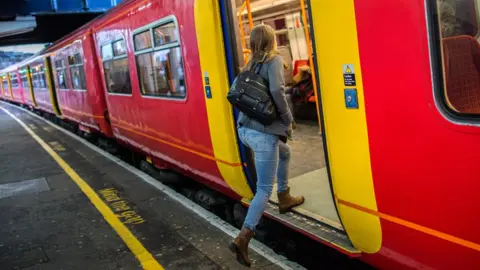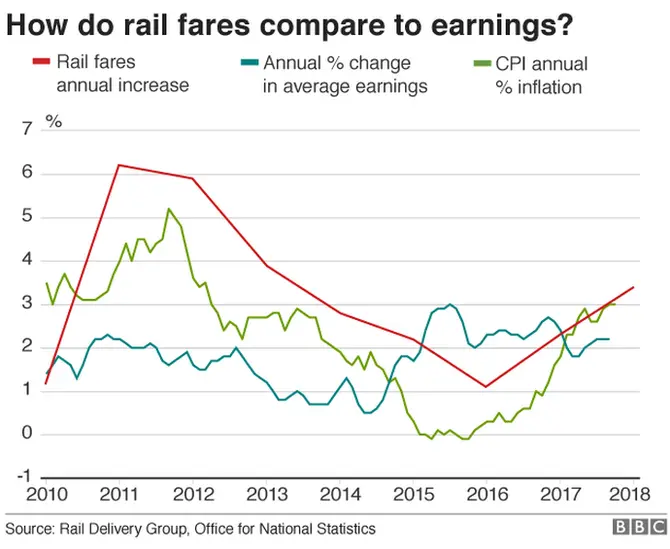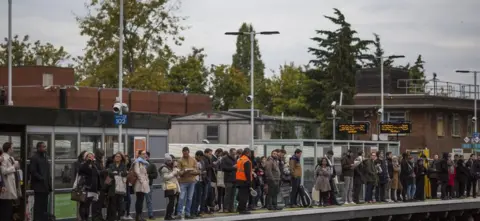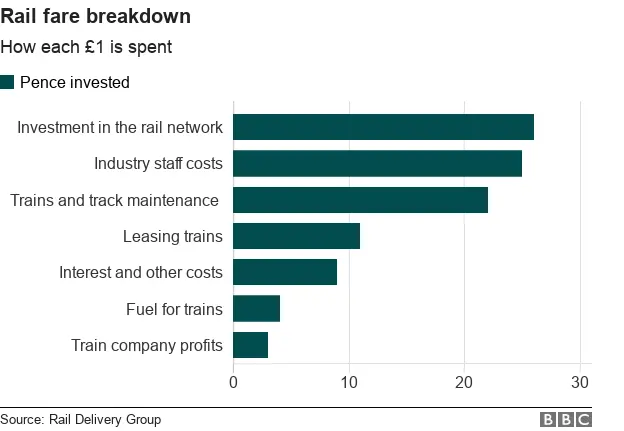Rail fare rise biggest for five years
 Getty Images
Getty ImagesTrain fares in Britain will go up by an average of 3.4% from 2 January.
The increase, the biggest since 2013, covers regulated fares, which includes season tickets, and unregulated fares, such as off-peak leisure tickets.
The Rail Delivery Group admitted it was a "significant" rise, but said that more than 97% of fare income went back into improving and running the railway.
A passenger group said the rise was "a chill wind" and the RMT union called it a "kick in the teeth" for travellers.
The rise in regulated fares had already been capped at July's Retail Prices Index inflation rate of 3.6%.
The fare increase is above the latest Consumer Prices Index inflation figure of 3%, which was a five-and-a-half year high.
The average rise in Scotland is 3.2% - below the national average.
A Scotrail spokesman told the BBC that 85% of their revenue comes from fares regulated by the Scottish government.
He added: "We are investing millions of pounds to build the best railway Scotland has ever had, and that's why we remain the best performing large operator in the UK."
The chief executive of passenger watchdog Transport Focus, Anthony Smith, said: "While substantial, welcome investment in new trains and improved track and signals is continuing, passengers are still seeing the basic promises made by the rail industry broken on too many days."
One in nine trains has arrived late at its destination in the past 12 months.

The Rail, Maritime and Transport (RMT) union general secretary Mick Cash said: "These fare increases are another twist of the economic knife.
"The private train companies are laughing all the way to the bank."
A Department for Transport spokesperson said: "The government carefully monitors how rail fares and average earnings change and keeps the way fare levels are calculated under review.
"We are investing in the biggest rail modernisation programme for over a century to improve services for passengers - providing faster and better trains with more seats."
Paul Plummer, Rail Delivery Group chief executive, told the BBC's Today programme: "We are very aware of the pressures on people and the state of the economy and are making sure everything we do is looking to improve and change and make the best use of that money."
Mr Plummer admitted it was "a significant increase" in fares - the highest since they rose by 3.9% in January 2013.
Figures published by the Office of Rail and Road in October showed that £4.2bn was given to the rail industry in 2016-17 - a drop of nearly 13% on the previous year, taking inflation into account.
The Rail Delivery Group said that private investment in rail reached a record £925m in 2016-17.

Analysis: Richard Westcott, BBC transport correspondent
 Getty Images
Getty ImagesYou might think that popularity is a good thing, but it's causing the railways some problems.
Here's some examples. Passenger numbers on routes into King's Cross have rocketed by 70% in the past 14 years. On Southern trains, passenger numbers coming into London have doubled in 12 years.
That's got to be good for easing congestion and reducing vehicle pollution... but much of our rail network is still Victorian and it's buckling under the strain of all those extra people.
There is a push to bring in new trains, stations and better lines, but it's difficult to upgrade things while keeping them open and it's seriously expensive.
The money's got to come from somewhere and in recent years it's the fare payer that's been asked to pick up a bigger proportion of the tab.
It means that, year in and year out, many people have seen their season ticket go up much more than their salary, if they've had a salary rise at all.



Selection of new annual season ticket costs from January 2018
Brighton to London - £4,332 - £148 increase
Gloucester to Birmingham - £4,108 - £140 increase
Woking to London - £3,248 - £112 increase
Liverpool to Manchester - £3,152 - £108 increase
Maidenhead to London - £3,092 - £104 increase

Your view
The rise has been met with anger by readers of the BBC News website.
Tammy, who commutes into London from Milton Keynes, has seen her season ticket price rise from under £4,000 to nearly £6,000. She said: "I think the price increase over the past eight years is disgusting,"
Dan said: "This is a bit of a joke at this point. I can't see how people will be able to afford to get to and from London soon."
The quality of service also frustrates commuters.
York-to-Manchester traveller Sunil Sahadev said: "This is absolutely horrendous. Trains are almost always late and crammed. I feel really helpless and frustrated.."
Richard Cooper from East Sussex, said: "As a 20+ year victim of Southeastern, I have seen little or no improvement in the quality or punctuality of services. We can only dream of a 9% lateness rate."
James Mercer, who travels in south London, said: "Never a day goes by without a delay or more often than not a cancellation."
And Nick Moore, who stood on a journey from Coventry to Birmingham recently, said: "If you booked a flight and you found out the flight was full, you would have to wait - not stand!"
